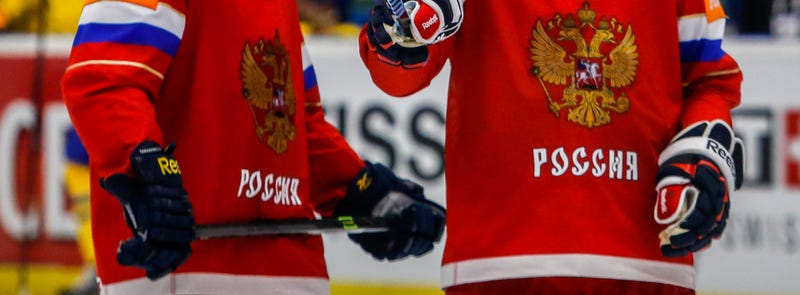
The IIHF World U18 Championships begin in Grand Forks, N.D., next week, and the Russian team was set to fly out tomorrow. Today it was revealed that the head coach has been fired and the entire roster will be replaced because too many players tested positive for the recently banned substance Meldonium.
The doping aspect was first reported by AllHockey.ru, which says the under-18 roster is expected to be replaced by Russia’s top U17 players. RSport, which is part of the government-funded Russia Today conglomerate and therefore the closest thing to a state organ for sports, doesn’t mention Meldonium, or the reported positive doping tests. It merely says the Russian team “had every right to change” its roster.
Slava Malamud has more:
Meldonium, which was officially banned by WADA on Jan. 1, has hit Russian athletes disproportionately hard—Maria Sharapova is merely the highest-profile athlete to test positive so far. The official number is north of 30 athletes, after four judokas were announced to have failed drug tests this weekend. The actual number is higher when you consider the entire teams that have been withdrawn from competition and testing scrutiny. In February, a Russian volleyball club pulled out of a tournament. Just this week has seen the Russian national curling team and the U18 hockey team overhaul their rosters. In call three cases, observers believed the moves were made to avoid in-competition drug testing.
http://deadspin.com/maria-sharapov…
Despite WADA’s black-and-white stance on this, the controversy over Meldonium is more of a culture clash. It’s fairly low-level as far as banned substances go—it’s sold over-the-counter in Russia and some Eastern European countries as a heart medication, and athletes and trainers believe it helps with endurance. A New York Times article on the rash of positive tests explains how Russians are baffled that WADA would consider it cheating.
Until the fall, Russian teams had used the drug regularly and openly, viewing it as a remedy for fending off exhaustion and heart problems. Most team coaches would keep a supply, administering it along with other standard vitamins.
“I’ve been working for 20 years; we could never imagine that it would be included as a doping substance,” said Sergei Sheremetiev, a physician with Russia’s ski-jumping team.
So it’s not so simple as Russian athletes wantonly using banned performance-enhancing drugs. (Though it is exactly that.) It’s Russian sports being asked to completely change their longtime training regimens in service of a new rule they see as arbitrary and morally indefensible, and specifically targeting them. And if that means they have to send a bunch of 16-year-olds to a tournament full of 17-year-olds to avoid having their results thrown out by failed in-competition tests, so be it.



